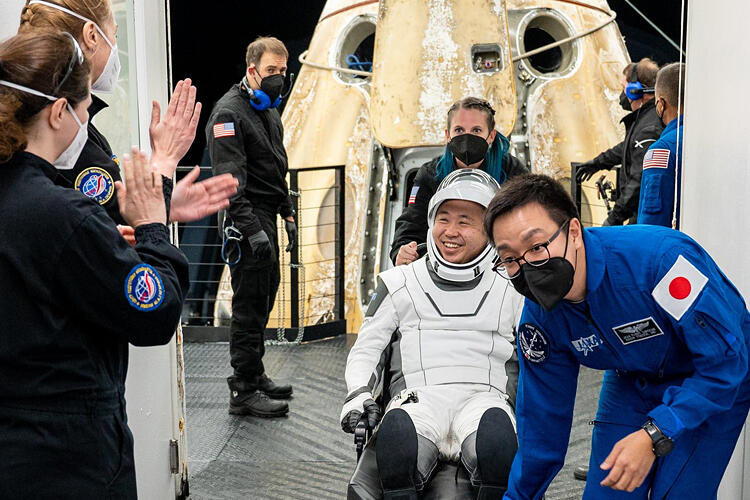'Crew Dragon,' the spaceship owned by SpaceX in the US, carried four astronauts, including Dr. Koichi Wakata (59). After their 5‐month stay at the International Space Station (ISS), the shuttle landed in the water off the coast of Tampa, Florida, USA on the morning of March 12, 2023, Japan time; all the crew landed safely. Wakata completed his missions, which involved conducting several experiments and two extravehicular activities during his stay in space; these were his first extravehicular experiences. It was Wakata's fifth flight.

(courtesy of Keegan Barber, NASA)
‐ The spirit of harmony, and challenging days in space with friends
Missing the scent of grass at home ‐
(translated from Japanese)
On the afternoon of the March 10, 2023, just before departing from the ISS, Wakata posted a poem on his Twitter that expressed his feelings about his stay in space as well as his longing to return to Earth. Before dawn on March 11, 2023, the day of the Great East Japan Earthquake 12 years ago, he posted, "The region once destroyed by the earthquake looks bright and shiny from the ISS, making me think of the images of people full of energy in whatever they are doing."
Wakata, parting from seven crewmembers from the US, Russia and the United Arab Emirates (UAE) who remained on the ISS, boarded Crew Dragon with three other members from the US and Russia. At 4:20 on the afternoon of March 11, 2023, the crew was disconnected from the ISS, which was approximately 400 km above sea level. The vehicle descended gradually and entered Earth's atmosphere. The parachutes opened, and the astronauts landed on the water at 11:02 on the morning of March 12, 2023.

(both courtesy of NASA Television)
Wakata and the crew boarded the fifth Crew Dragon, a full‐fledged operational vehicle. This was the same vehicle Wakata and the crew were on when they arrived at ISS. The astronauts were on a capsule named 'Endurance,' which returned to Earth last May as part of the Crew‐3 mission and had completed its second roundtrip operation.
Wakata had been on the ISS since October 7 of last year. He and an astronaut from the US paired up and performed extravehicular activities twice from January 20 to 21, 2023 and February 2 to 3, 2023. Among other activities, they prepared for the installation of a new solar battery panel. These activities lasted up to 14 hours in total.
In addition, they conducted other missions, including experiments using the Japanese Experiment Module 'Kibo,' along with other relevant activities. Namely, (1) he used a device to reproduce gravity on the moon or Mars to investigate the nature of liquids, which may be helpful for future explorations; (2) he performed experiments using nematodes to observe their movements under microgravity conditions to determine the influence of aging during space flight; (3) he used various materials to examine the way how these materials burn in microgravity to develop plans in the event of a fire on space ships or bases; and (4) he levitated samples with high melting points by charging them and examined their physical properties. He enthusiastically performed experiments to recycle potable water and exposed devices and materials in space, participated in a remote robot competition with young participants within or outside his country, conducted experiments proposed by the general public, and launched a very small artificial satellite.

(both courtesy of JAXA and NASA)
In February, he posted a message to 'Science Portal,' a news site on science and technology and part of the Japan Science and Technology Agency (JST). He expressed his impressions on the ISS and 'Kibo,' emphasizing: "I expect that the new technology and knowledge acquired in the ISS will expand the sphere of human activity."
According to Japan Aerospace Exploration Agency (JAXA), his flight duration this time was 157 days. The accumulated total duration of his stay in space was 504 days over five trips, which is the longest among all Japanese astronauts.
Another Japanese astronaut, Satoshi Furukawa (58), will be staying on the ISS for a long period this year. JAXA, with a view towards lunar activities as well, selected two new candidates as astronauts, Makoto Suwa (46), who works for an international organization, and Ayu Yoneda (28), a surgeon.
Original article was provided by the Science Portal and has been translated by Science Japan.




